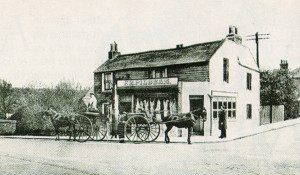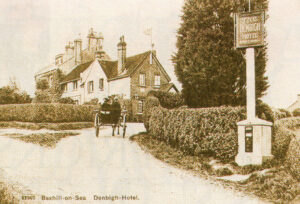 In the small seaside town of Bexhill-on-I Sea, Sussex, in about 1924, Dick Milner, JL Norman Hyde and myself were eight-year-old inseparables. Our individual fathers were: local grocer; headmaster of Down Council School and Bexhill’s only master printer.
In the small seaside town of Bexhill-on-I Sea, Sussex, in about 1924, Dick Milner, JL Norman Hyde and myself were eight-year-old inseparables. Our individual fathers were: local grocer; headmaster of Down Council School and Bexhill’s only master printer.
The weather played a large part in the quality of our summer lives. As I remember, school days were always cold, wet and miserable – but Saturdays, Sundays and holidays were invariably warm, sunny, exciting and busy. Even the obligatory morning Sunday School could be dealt with by a nominal appearance, then a call to the downstairs toilet and escape by the rear doors, always left unlocked for safety reasons.
One holiday morning, fate decided to launch us onto the best of all adventures -‘Beer-Wagon Steam-Engine Operation’.
In the town was a brewery company, Fremlins, whose trade-mark on all their botde-labels was a picture of a poor, tired, old elephant,
Every other Saturday morning, a monstrous steam-driven lorry and trailer, loaded with barrels would leave the depot to head towards Lewes. We found it stopped by the roadside with a big hosepipe hanging in the nearby stream.
This had to be investigated and so to the man-mountain driver-drayman, we asked: “What you stopped for, mister?”
“To fill her up, ” he replied.
“Why don ’tyou get water from the tap ? ”
“‘Cos this water’s better. ”
His reply left us little wiser – wasn’t water just water?
We wandered round to the back of the trailer and saw the large cross-beam platform used for unloading the barrels or, as we preferred to think, an ideal passenger-seat.
“Can we have a ride mister?’’
“Just you sit still and don’t fool about – I’m stopping at the Denbigh and mind the traffic. ”
 The Denbigh pub at the top of the hill still stands today, little changed after some sixty or more years. What could be more perfect? The traffic referred to was predictable – a flat-top milk-float carrying two large brass milk-chums and the large canvas-covered Carter-Paterson’s delivery cart drawn by two
The Denbigh pub at the top of the hill still stands today, little changed after some sixty or more years. What could be more perfect? The traffic referred to was predictable – a flat-top milk-float carrying two large brass milk-chums and the large canvas-covered Carter-Paterson’s delivery cart drawn by two
massive shire-horses.
Apart from these, ‘traffic’ might be a Ford car, an open-top charabanc, a belt-driven Levis motor-bike or one or two riders and horses. There were plenty of cyclists.
So, our adventure started, legs dangling just above a road riddled with pot-holes, the trailer springless on solid rubber-tyre wheels, our beam-seat scored and worn after many years of rough usage. How we savoured the occasion, riding in majestic splendour – but acute discomfort. What an achievement!
That was the programme every other Saturday, giving us considerable social standing amongst our less opportunistic and venturesome friends. Then some weeks later, well and uncomfortably settled on the platform with Fred working up to his full six mph – disaster struck!
It arrived in the form of Police Constable Boniface on his bicycle, rounding the corner. Time stood still! Like mesmerised rabbits, we could only wait. He saw us and went into overdrive, pedalling madly.
As he overtook, I saw that his face was very flushed – funny how, in times of crisis, one notices little things.
Then the wagon stopped. The Law was in action. Pc Boniface walked his bicycle back past us, carefully and deliberately propping it against the curb. So far not a word had been spoken. Then slowly from his tunic pocket, he pulled out his notebook.
By reputation he was a brutal, sadistic tyrant who had dedicated his life to the destruction of juvenile human rights. He had only joined the police because it provided the perfect platform on which to indulge his vicious obsession.
He made simple everyday pleasures and pastimes almost impossible but, for some misguided reason or just plain ignorance, parents condoned and even encouraged his behaviour.
He would appear, as if by magic, when an apple scrumping operation was in progress, tying door handles together, riding no hands, three-on-a-bike, no lights, gutter marbles, hoops on the pavement – all these innocent pastimes were suppressed; even the ancient profession of conker-harvesting was threatened.
This was a skilled craft – when the conkers
were ready they were gathered, either by climbing the tree, shinning along the branch and knocking the bunches off with a long stick or, if the tree could not be climbed, sticks or stones were thrown up at the nuts. The former method was more efficient. We accepted the argument that broken branches, husks and leaves occasionally littered the area – but you can’t make an omelette without breaking eggs!
‘Boni’ would suddenly appear with Mr. Harmer, the old misery employed by the Council to look after the Down and its cricket pitch; like a pair of wolves they would wait, silent and patient, for the workers to climb down – then the notebook appeared. Names and addresses were recorded; finally, after all the hard work, the crop was stolen by the two honest officers!
The financial loss was considerable – clean, first-quality conkers could fetch 2d., even ordinary ones were good for a halfpenny.
The monster towered over us, notebook in hand.
“Names -you, you and you. ”
These were recorded, slowly and carefully, then:
“You three wait there, I want a word with the driver. ”
Obediendy, we waited and watched as he marched to the wagon to arrest the driver.
We heard snippets of the conversation.
“What are these kids doing on your trailer ? ”
“Why, officer, are they still there ? I told ‘ern they was to get off and go home. ”
The cowardly, treacherous quisling had deserted us!
We waited for him be dragged from his cab, in handcuffs. But no shouting, swearing or fighting – in fact they were chatting and laughing!
While this was going on, Norman (our legal adviser, because father was a headmaster) whispered that there was nothing to worry about as ‘Boni’ had forgotten to take addresses – this oversight put us in the clear!
The Law marched back to us – no longer laughing, face like thunder.
“Right you lot – get yourselves off home – now! ” Then came the coup-de-grace, snatching away our last crumb of comfort:
“I know where you live and shall be calling on your fathers later.”
Suddenly, the morning was dark and cold, our cups of misery overflowed. By silent, common consent we went to the ‘camp’, a clearing in the gorse bushes behind the cricket pavilion where all group matters were settled. The situation was serious.
We must agree on action and either stick together or hang together. There were three hopeful solutions on offer.
First – the Honest George Washington solution: namely – go home and tell the truth, using the barest economy.
Second – beat ‘Boni’ to the draw – tell our dads we had been set upon and ‘framed’, innocent victims of a cruel system.
Third – the ‘Ostrich and Sand’ solution practised by governments through the ages -do nothing and hope.
First and second were rejected out of hand. Third, not perfect, was the least unattractive.
On this miserable, pessimistic note we went home.
It is interesting to speculate on social change over the years. Today’s young braves would have a different approach. If PC Boniface dared to order them home in like manner, the Norman Hyde equivalent reaction would be:
“Now see here, officer, I have your number. Our fathers will be suing for psychological and mental distress – we shall require expensive counselling. ”
The officer would tear up his notes, apologise and drive off in the Panda.
But, back to 1924, days of apprehensive misery followed – when would he visit?
Would he fine us, if so, HH how much? Perhaps prison! Days became
weeks, and nothing happened. Like a sinister black cloud that ‘notebook’ hovered. It was common knowledge that any name written in his book – like a tattoo – could never be erased. It over-shadowed our lives -no marbles, camp fires in the bushes, cycling on the cricket pitch – even old Harmer’s rotten conker trees were safe; the apple trees in Ellerslie Lane escaped.
‘Boni’ did not carry out his threat to “call on our fathers”. Weeks became months, still he kept us in suspense, leaving little enthusiasm for a return to our legitimate antisocial activities – basically because of that notebook.
It just happened that a young master plasterer and amateur boxer Reg Cane, two years earlier, had interested a consortium of local businessmen in a very ambitious project to raise money to build a first-class sports centre. He formed a committee which pleaded, begged and bullied the whole town tirelessly until the capital was raised by dint of hard work and dedication.
One little gimmick which took off like today’s Lottery – for ten shillings you could buy a brick with your name on it. The individually moulded bricks can still be seen.
The project was successful beyond wildest hopes and it was opened in 1925.
At about that time, for some reason, the fathers of us three lads arranged for us to meet Mr Cane.
We subsequently became junior members of the Bexhill Athletic Club and soon found its demands left little spare time for making social pests of ourselves.
Forty years later, I was sitting outside the same cricket pavilion on the Down, watching a match, when an elderly gentleman sat on the seat beside me. “You ’re young Chandler, I believe. ”
But who was he?
“You don’t recognise ‘Boni 1 ”
Indeed, he was Police Sergeant Boniface (retired). This tall, upright, nice-looking man was the brutal tyrant who terrorised we young boys.
We began to talk about the past. From where we were sitting, I could see where our confrontation happened and I reminded him. ‘Just what did you put in your notebook ? ” I enquired. He looked at me and winked: “Wouldn’tyou like, to know!”Then I asked why he never did call on our dads. “I didn’t but Reg Cane did -and I’ll tell you something else, old man Harmer recovered his sanity soon after. ”
Reg Cane died in 1995, aged 94. At the funeral, the church was full and overflowed outside with friends and townsfolk saying good-bye to a truly great man, who for more than sixty years had dedicated his life to the welfare of youngsters. He served in two world wars and was appointed Justice of the Peace in 1962, specialising in helping young offenders. He was both a gentle man and a gentleman, living a happy and totally fulfilled life in the humblest of circumstances.
H.H. Chandler








